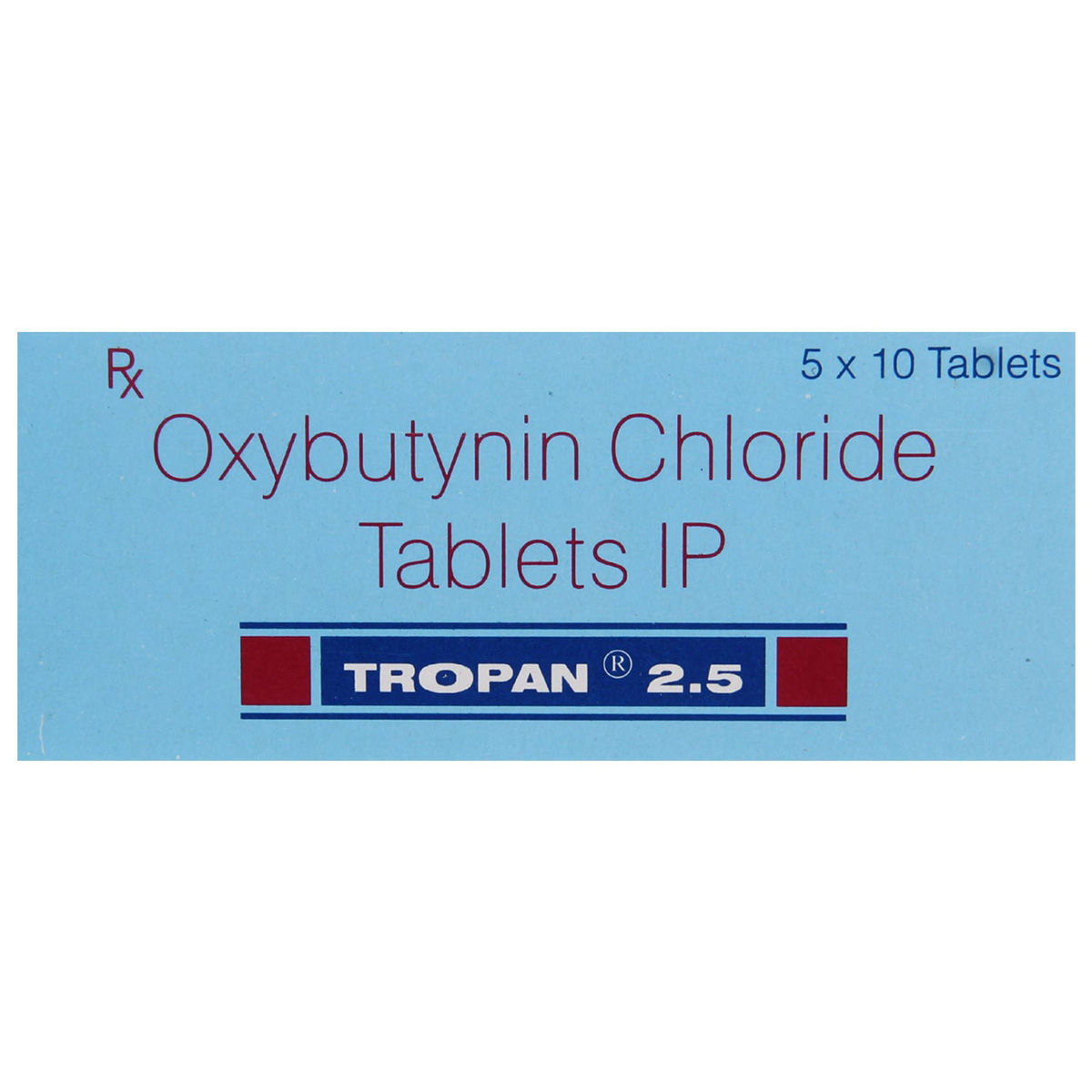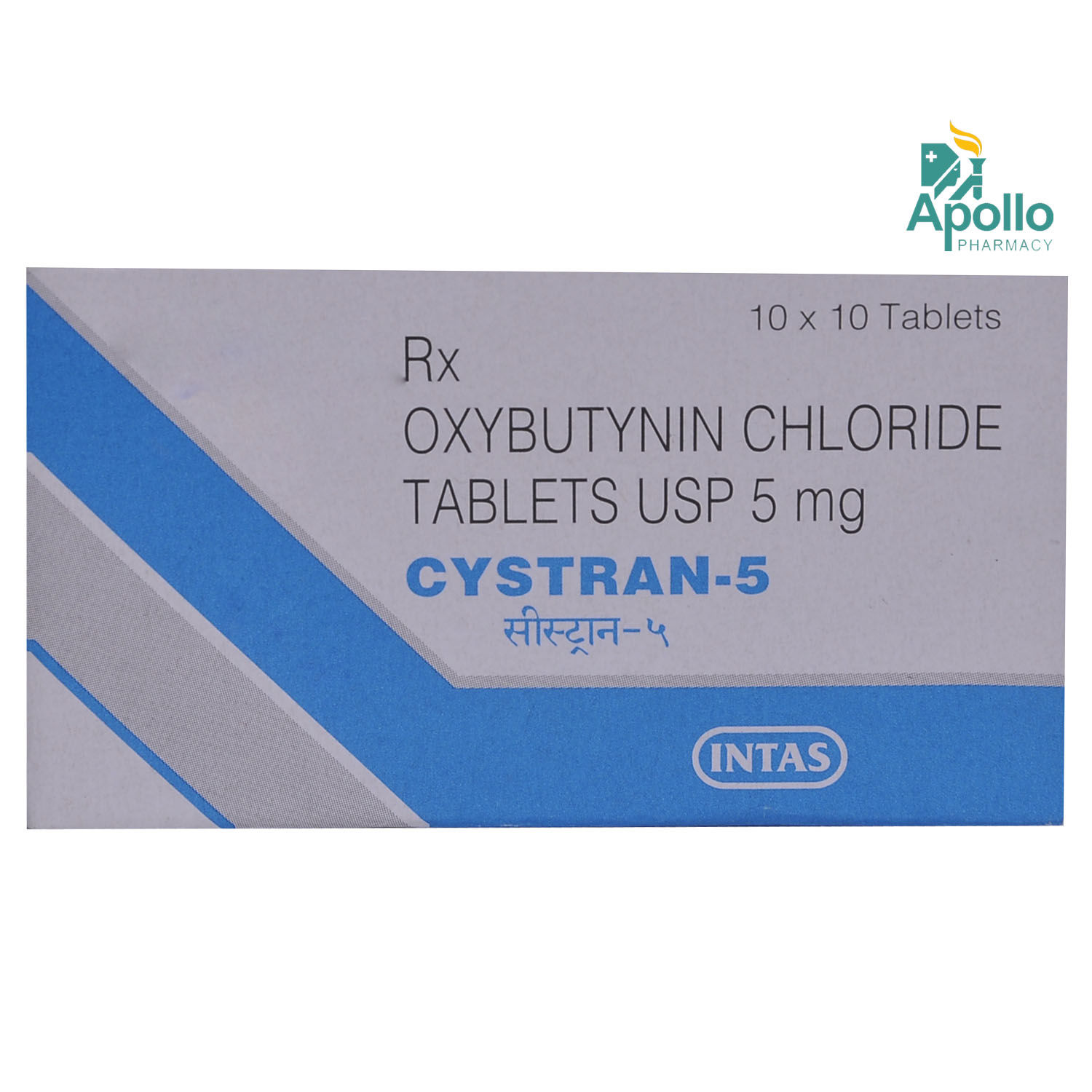Oxybutynin Chloride
About Oxybutynin Chloride
Oxybutynin Chloride is used to treat overactive bladder (OAB) with symptoms of urinary incontinence (urine leakage), urgent or frequent urination, increased night-time urination, and dysuria (painful or difficult urination). Additionally, Oxybutynin Chloride is used to treat night-time bed-wetting in children above 5 years when other treatments have not worked.
Oxybutynin Chloride contains 'Oxybutynin chloride', which works by blocking the release of a chemical transmitter called acetylcholine, responsible for bladder muscle contractions. Thereby relaxing the smooth muscles of the urinary bladder and stopping sudden muscle spasms (contractions). This helps control urine by delaying the initial desire to empty the bladder and increases the urine-holding capacity of the bladder.
Take Oxybutynin Chloride as prescribed. You are advised to take Oxybutynin Chloride for as long as your doctor has recommended it for you, depending on your medical condition. In some cases, you may experience certain common side effects, such as dizziness, sleepiness, headache, facial flushing, constipation, dry mouth, dry skin, urinary retention, and diarrhoea. Most of these side effects do not require medical attention and will resolve gradually over time. However, you are advised to talk to your doctor if you experience these side effects persistently.
Consult your doctor if you are pregnant or breastfeeding. Oxybutynin Chloride may cause dizziness, drowsiness, sleepiness, and blurred vision, so drive only if you are alert. Oxybutynin Chloride should not be given to children below 5 years as safety and efficacy have not been established. Avoid consuming alcohol along with Oxybutynin Chloride as it could lead to increased drowsiness. Keep your doctor informed about your health condition and medications before taking Oxybutynin Chloride to rule out any unpleasant side effects.
Uses of Oxybutynin Chloride
Medicinal Benefits
Oxybutynin Chloride is used to treat overactive bladder with urinary incontinence symptoms (urine leakage), urgent or frequent urination, increased night-time urination, and dysuria (painful or difficult urination). Oxybutynin Chloride works by blocking the release of a chemical transmitter called acetylcholine responsible for bladder muscle contractions. Thereby relaxing the smooth muscles of the urinary bladder and stopping sudden muscle spasms (contractions). This helps control urine by delaying the initial desire to empty the bladder and increasing the bladder's urine-holding capacity. Oxybutynin Chloride decreases both the frequency and urgency of urination and helps with bladder control in people with overactive bladder. Oxybutynin Chloride is also used to treat night-time bed-wetting in children above 5 years when other treatments have not worked. Oxybutynin Chloride may also be used in adults and children aged 6 years or older to control bladder muscles with spina bifida and other nervous system conditions.
Directions for Use
Storage
Side Effects of Oxybutynin Chloride
Dizziness
Sleepiness
Headache
Facial flushing
Constipation
Dry mouth
Dry skin
Urinary retention
Diarrhoea
Drug Warnings
Do not take if you are allergic to any of its contents; if you have myasthenia gravis (muscle problems), narrow-angled glaucoma, blockage/perforation in stomach or intestine, ulcerative colitis (inflammation of the large intestine), urinary blockage, frequent urination at night caused by kidney or heart disease. Inform your doctor before taking Oxybutynin Chloride if you are 65 years or older; if you have an overactive thyroid, high blood pressure, glaucoma, irregular heartbeats, enlarged prostate, gastrointestinal disorders, indigestion, heartburn, heart, liver or kidney problems. Consult your doctor if you are pregnant or breastfeeding. Oxybutynin Chloride may cause dizziness, drowsiness, sleepiness, and blurred vision, so drive only if you are alert. Oxybutynin Chloride should not be given to children below 5years as safety and efficacy have not been established. Avoid consuming alcohol along with Oxybutynin Chloride as it could lead to increased drowsiness. Consult your doctor immediately if you experience hallucinations while taking Oxybutynin Chloride.
Drug Interactions
Drug-Drug Interactions: Oxybutynin Chloride may have interaction antihistamine (diphenhydramine), cholinesterase inhibitors (donepezil), pain killer (acetaminophen, oxycodone, hydrocodone), anti-hypertensive (metoprolol), anti-muscarinic agent (mirabegron), anti-psychotic (prochlorperazine, chlorpromazine, clozapine, haloperidol), anti-depressants (amitriptyline, imipramine, dosulepin), antiparkinson agents (levodopa, amantadine), cardiac glycoside (digoxin), anti-platelet (dipyridamole), anti-fungal (ketoconazole, itraconazole, fluconazole), antibiotics (erythromycin), anti-emetic (metoclopramide, domperidone), and anti-arrhythmic agent (quinidine).
Drug-Food Interactions: Avoid consuming alcohol along with Oxybutynin Chloride as it could lead to increased drowsiness.
Drug-Disease Interactions: Oxybutynin Chloride may interact with conditions such as urinary obstruction, gastrointestinal obstruction, autonomic neuropathy, infectious diarrhoea, angle-closure glaucoma, and myasthenia gravis (muscle problems).
Drug-Drug Interactions Checker List:
Safety Advice

Alcohol
unsafeYou are recommended to avoid alcohol consumption while taking Oxybutynin Chloride. Alcohol intake, along with Oxybutynin Chloride, may cause increased drowsiness.

Pregnancy
cautionPlease consult your doctor if you have any concerns regarding this; your doctor will prescribe Oxybutynin Chloride only if the benefits outweigh the risks.

Breast Feeding
unsafeOxybutynin Chloride may pass into breastmilk. Please consult your doctor if you have any concerns regarding this; your doctor will decide whether breastfeeding mothers can take Oxybutynin Chloride or not.

Driving
unsafeOxybutynin Chloride may cause dizziness, drowsiness, sleepiness, and blurred vision. Do not drive or operate heavy machinery unless you are alert.

Liver
cautionPlease consult your doctor before taking Oxybutynin Chloride if you have a liver impairment or any concerns regarding this.

Kidney
cautionPlease consult your doctor before taking Oxybutynin Chloride if you have kidney impairment or any concerns regarding this.

Children
cautionOxybutynin Chloride can be given to children above 5years if prescribed by the doctor.
Habit Forming
Diet & Lifestyle Advise
Pelvic floor exercises would help treat bladder spasms.
Avoid foods like sugars, carbonated beverages, tea, citrus fruits, tomatoes, spicy foods, chocolate and tea.
Limit fluid intake as excess fluid intake could cause an urge to urinate frequently.
Avoid drinking excess alcohol or caffeinated drinks as they can worsen the symptoms.
Maintain a healthy weight, exercise regularly.
Avoid smoking and alcohol intake.
Take 6-8glasses of water or liquids every day.
Avoid processed foods. Instead, choose whole, unprocessed foods.
Include fruits, vegetables, and fibre-rich food in your diet.
Special Advise
A regular dental check-up is recommended if you are on long-term treatment with Oxybutynin Chloride.
Patients Concern
Disease/Condition Glossary
Overactive bladder (OAB): The contraction or tightening of bladder muscles causes bladder spasms. This is termed an overactive bladder. Continuous contractions may cause an urge to urinate. Overactive bladder is characterised by involuntary leakage of urine, excessive urination, and urgent need to urinate. The common causes of bladder spasms are urinary tract infections, drinking too much caffeine or alcohol, diabetes, constipation, impaired kidney function, bladder stones, enlarged prostate, or neurological disorders. Overactive bladder symptoms include urinating more than 8 times in a day and more than 2 times at night, strong and sudden need to urinate, leakage of urine, and loss of bladder control.
FAQs
Oxybutynin Chloride is used in the treatment of overactive bladder (OAB). It relieves symptoms of urinary incontinence (urine leakage), urgent or frequent urination, increased night-time urination, and dysuria (painful or difficult urination). Additionally, it is used to treat night-time bed-wetting in children above 5 years when other treatments have not worked.
Oxybutynin Chloride works by blocking the release of a chemical transmitter called acetylcholine which is responsible for bladder muscle contractions. Thereby relaxing the smooth muscles of the urinary bladder and stopping sudden muscle spasms (contractions).
Dry mouth could be a side-effect of Oxybutynin Chloride. Limiting caffeine intake, avoiding smoking and mouthwashes containing alcohol, drinking water regularly, and chewing sugar-free gum/candy might help in stimulating saliva and thereby prevents drying of the mouth.
There is some overlap between the symptoms of both OAB and BPH. OAB occurs due to uncontrolled urinary bladder muscle contractions. The main symptom of OAB is a sudden urge to urinate that's hard to control. On the other hand, BPH occurs due to an enlarged prostate gland, which puts pressure on the urinary bladder, thereby causing pain during urination.
Oxybutynin Chloride should be used with caution during hot weather as it may increase the chance of having a heat stroke. Avoid becoming dehydrated or overheated during exercise and in hot weather. Inform your doctor if you have heat intolerance or fever.
Consult your doctor before taking Oxybutynin Chloride if you have glaucoma. Oxybutynin Chloride is contraindicated in patients with narrow-angle glaucoma. Contact your doctor immediately if you experience loss of vision, blurred vision, or pain in the eye.
Oxybutynin Chloride may reduce the amount of saliva, thereby causing fungal infection of the mouth and tooth decay. To avoid this, maintain proper oral hygiene while taking Oxybutynin Chloride. A regular dental check-up is recommended if you are on long-term treatment with Oxybutynin Chloride.
To ensure its effectiveness and minimize potential adverse effects, strictly follow your doctor's dosage and duration instructions. Be aware of potential drug interactions and avoid alcohol consumption. If you have any side effects, contact your doctor right away. By following these suggestions, you can optimize the benefits of Oxybutynin Chloride while minimizing its risks.
The duration of taking Oxybutynin Chloride depends on your individual condition and response. Your doctor will advise you on the treatment length, typically 6-8 weeks, for the full benefits to take effect. Be sure to follow their instructions carefully and consult them before making any changes or if your symptoms don't improve within 8 weeks.
Oxybutynin does not make you pee. It actually helps reduce the frequency of urination and the urgent need to urinate by relaxing the bladder muscle.
The most common side effects of the Oxybutynin Chloride are dizziness, sleepiness, headache, facial flushing, constipation, dry mouth, dry skin, urinary retention, and diarrhea. These side effects are usually mild and temporary and resolve as your body adjusts to the medication. However, if any side effects persist or worsen, it's essential to consult your doctor for proper guidance and care.
Consult your doctor before taking Oxybutynin Chloride if you're breastfeeding, as Oxybutynin Chloride may pass into breast milk. Your doctor will assess the risks and benefits and decide whether the medication is necessary for you, considering your individual needs.










